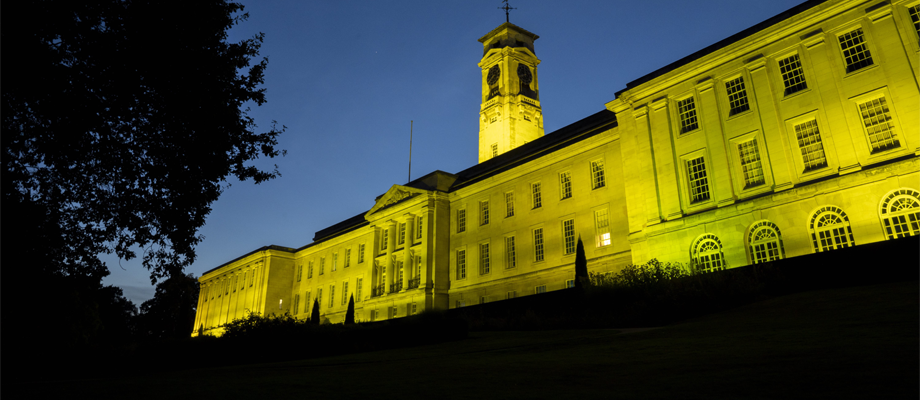
Trent Building gold light up extended to support Childhood Cancer Awareness
September 1st, 2022
The university is extending its support for Childhood Cancer Awareness with the iconic Trent Building being lit gold for three days, giving more people the opportunity to see it and find out about the cause.
Childhood Cancer Awareness month (CCAM) takes place every September to highlight the signs and symptoms, diagnosis and treatments for children’s cancers with the aim of raising awareness and funds.
Following its debut gold light up for one day last year the Trent Building will be glowing gold again for three evenings, from Thursday 1 – Saturday 3 September. It will join iconic buildings across the region and UK who are lighting up gold during the month.
Research into Childhood Cancer is taking place at the university with Dr Shaarna Shanmugavadivel leading the Childhood Cancer Diagnosis Study alongside the Children’s Cancer and Leukaemia Group (CCLG) to understand how cancer is diagnosed in children and young people across the UK.
Earlier this year the study group developed a protocol for clinicians around the world which will help to close the gap between diagnosis and treatment of childhood cancer and could increase the chance of survival from the disease.
The overall five-year survival estimate in the UK is 84% across all childhood cancers, which is lower than other countries in Europe. One of the possible causes for this is a delay between patients presenting with their symptoms to a clinician and receiving their diagnosis.
The new protocol outlines the methods used by the experts in the Childhood Cancer Diagnosis study, to better understand the current diagnosis pathway of childhood cancer referrals and diagnosis and will look to determine the exact reasons for these delays in diagnostic pathways.
Dr Shanmugavadivel said: “Raising awareness of the signs and symptoms of childhood cancer is vital if we are to improve diagnosis and outcomes for children, so it’s fantastic that the University is helping to shine a light on this during CCAM.
“There is misperception by the public and professionals that childhood cancer is rare which means it is often not considered until the child has multiple symptoms at which point it is more likely to be at an advanced stage. Time is crucial; untreated, tumours grow bigger and can spread around the body requiring more extensive surgery and more intensive therapies to offer cure.
We are really pleased to be able to share the protocol which we hope will allow other countries to understand the diagnostic pathways for their children and young people in order to really close the gap on childhood cancer outcomes both in the UK and globally.”
Jane Icke who works at the university is backing the CCAM campaign as her daughter Alice has been treated for cancer twice – kidney cancer in 2014, known as a Wilms tumour, which returned in her lung in 2015. Alice was treated at QMC and is now almost 5 years in remission.
Jane said: “The new protocol is a huge step in helping improve diagnosis for children. It took repeated trips to the GP with various symptoms before we got a cancer diagnosis for Alice. Her symptoms could have been many childhood illnesses which made it difficult to spot initially and it wasn’t until we took her with a very swollen tummy that we were sent to hospital.
Even then I never in a million years thought it could be cancer. Finding out your child has cancer is a devastating shock as are the treatments children face which are harsh and gruelling with many side effects.”
The research continues with the Childhood Illness Perception Study (ChIP) which aims to understand the public perception of childhood cancer in order to inform a new public and professional awareness campaign called Child Cancer Smart. Parents with healthy children as well as those who have experience of having a child with cancer or another long-term health condition are taking part in focus groups in order to understand their perceptions and where they go for information, advice and support for their child’s health.
This year also marked the first ever debate in the House of Commons about childhood cancer diagnosis and outcomes led by Dame Caroline Dinenage. Dr Shanmugavadivel, Professor David Walker and Ashley Ball-Gamble CEO of CCLG have been working with Dame Caroline and Charlotte Fairhall to urge the government to prioritise childhood cancer through a new Childhood Cancer Mission.
A number of Childhood Cancer charities are involved in CCAM fundraising activities including: CCLG, and Cancer Research UK
Leave a Reply
Other

Need news? See you on SharePoint
After 14 years of service, Campus News is being retired as the university’s staff news platform. […]

Roads and car parks closed for refurbishing work
As part of ongoing road improvements at the university, works will be taking place to resurface […]

